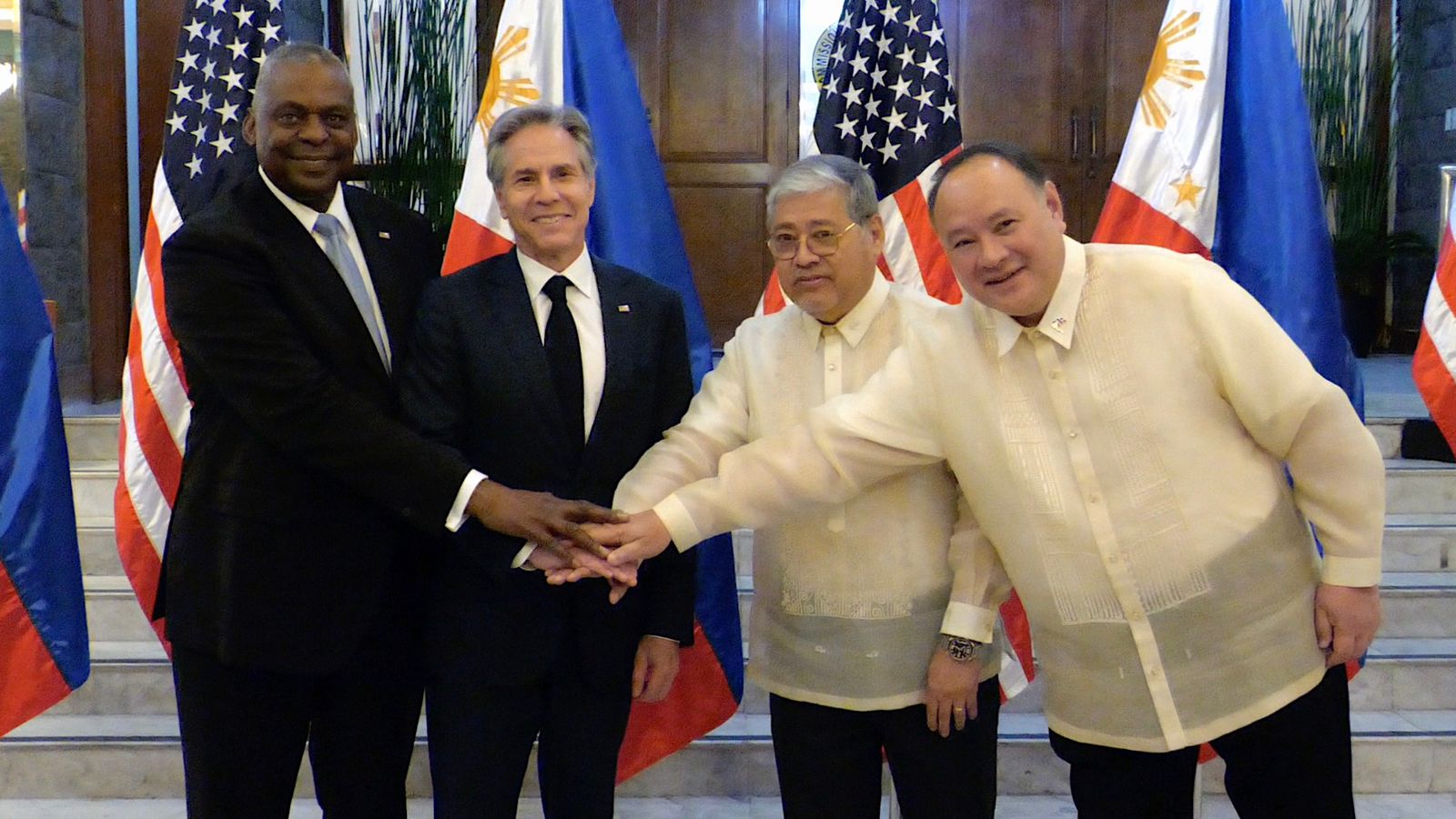
[From left to right] United States Secretary of Defense Lloyd Austin, United States Secretary of State Antony Blinken, PH Foreign Secretary Enrique Manalo, and PH Defense Secretary Gilberto Teodoro Jr. join hands during a photo opportunity before the start of ‘4th Philippines-US Two-Plus-Two Ministerial Consultations’ at the Tejeros Hall in Camp Emilio Aguinaldo, Quezon City on July 30, 2024. Ryan Leagogo/INQUIRER.net
This was announced during the policy-level dialogue held by top officials from Manila and Washington held in Camp Aguinaldo in Quezon City on Tuesday.
READ: US, Australia, Japan vow ‘coordinated security assistance’ to PH
US Secretaries of State and Defense Antony Blinken and Lloyd Austin III met with their Filipino counterparts Foreign Affairs Secretary Enrique Manalo and Defense Secretary Gilberto Teodoro Jr. for the fourth “2+2” ministerial dialogue, discussing policy directions on the Enhance Defense Cooperation Agreement (Edca) sites, and more military support amid tensions in the West Philippine Sea.
Blinken also called this a “once in a generation investment to help modernize the Filipino armed forces and Coast Guard.”
“The $500 million, this is really designed to support the modernization of Filipino forces, Coast Guard, as they transition to focus on external defense,” he also said.
Practical
Analysts welcomed this development, saying this “practical” move will put the alliance of both countries to the next level.
Security expert Chester Cabalza said this move signifies “a longer and lasting partnership” between both countries.
“Part of Washington’s ironclad commitment to Manila and its revived bilateral security ties under the Biden-Marcos administrations, this is a showcase to the new level of alliance,” Cabalza, president and founder of Manila-based think tank
Geopolitical analyst Don McLain Gill, said the move is “practical” and “mutually beneficial” for both countries, which, he said, was also triggered by two important catalysts.
“One important catalyst is the realization that the US is more than willing to show its commitment in being a trusted and responsible security provider to the Philippines,” Gill, a lecturer at the De La Salle University’s Department of International Studies, told INQUIRER.net.
“We also have to understand the second catalyst is that, for the United States to attain its interests in the Indo-Pacific at a time of great Chinese expansionism and revisionism, it would obviously be in Washington’s best interest to build the capacity of its allies and partners in the region,” he added.
Edca site development
Austin said: “This level of funding is unprecedented, and it sends a clear message of support for the Philippines.”
Of the $500 million, about $128 million will be allocated for the development of Edca sites, which refers to the country’s military camps where Washington is allowed to store equipment and deploy troops.
“President Biden’s budget request this year includes more than $128 million to fund important Edca infrastructure projects,” Austin said.
Two of nine Edca sites are located in coastal towns of Cagayan which is facing Taiwan, a self-ruled island regarded by China as a renegade province subject to reunification.
These new Edca sites irked Beijing, stressing that the agreement was made so that Washington could “encircle and contain China” which would drag the Philippines into “the Taiwan question,” a claim that was rejected by Manila.
Blinken, however, noted that Washington wants the status quo maintained in the Taiwan scenario.
“I think there’s a recognition around the world that were there to be some kind of crisis on Taiwan, it would affect everyone,” he said, noting the country’s role as passageway for commercial ships and its robust semiconductors industry.